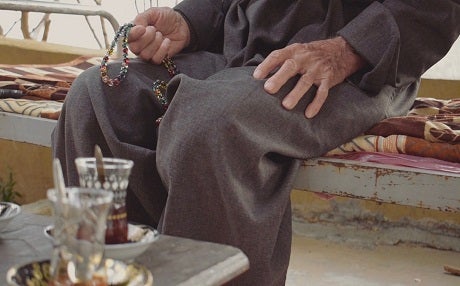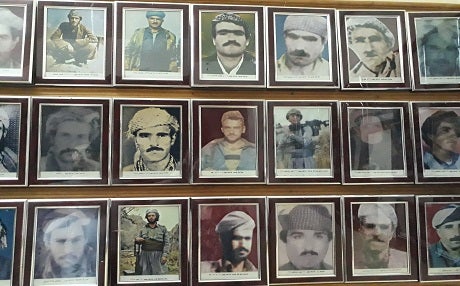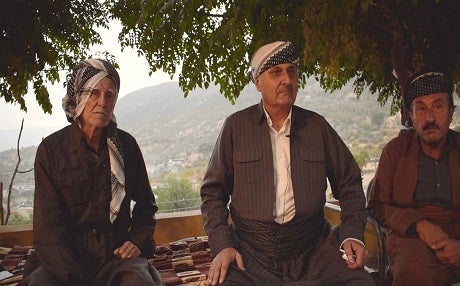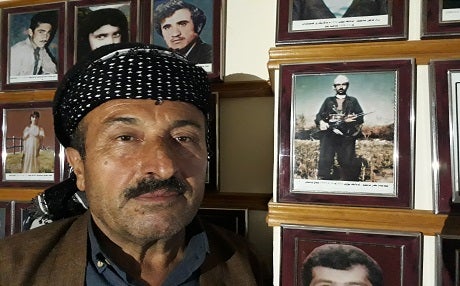SHEIKH WASANAN, Kurdistan Region – I met Mohammad Amin through a village council member in Sheikh Wasanan last month on a trip for a United Nations volunteer project. Amin, who was born in 1929, still suffers from breathing problems as a result of a chemical attack on his village thirty years ago.
Sheikh Wasanan, a tiny village sitting atop the mountainous region of the Balisan Valley in Kurdistan may not come to mind when people think of the chemical attacks and genocide carried out by Saddam Hussein and his Baath regime against the Kurds, but it just might be the most important.
Amin's family welcomed me into their home, sitting outside in a garden overlooking the village below. In traditional Kurdish style, hot tea was served before we began any conversation.

Amin told the story of surviving what some believe to be the first "experimental" site of chemical attacks the Baath regime, back when the village had a population of around 500. As he spoke he held a set of colorful prayer beads in one hand, gently counting each bead on the string as he slowly recounted the events which took place on that day, April 16, 1987.
He didn’t remember how old he was when he had to join the Iraqi army, but remembered well the day he ran away with his weapons and ammunition to join the Kurdish Peshmerga.
Amin spoke of many attacks on his village. The first was a conventional attack in 1963. He showed me a scar on his lower right arm sustained in one of many rebellions the Kurds led against the Baath regime.
On that spring day three decades ago a bomb landed on a house in the village and caused a massive fire. Thinking it was another conventional attack by the army, many villagers, entire families, friends, neighbors rushed to help rescue the wounded.
It wasn't until many people had arrived at the scene, that they realized something was different about this attack. Some villagers started falling to the ground when they reached the vicinity of the bomb site, their lips or eyes swelling, vomiting, some dying instantly, others taking several minutes to finally pass away.

A young mother died with her baby still breastfeeding. It was two days before the baby was found, surprisingly still alive and now lives in Erbil.
One of the survivors of the gas attack that day was a friend of Amin, Abdulrahman Faqe Khidir.
He lost his own brother in the attack that day, but with tears rolling down his face Khidir recalled the moment a neighbor gasping for air in front of him and begging him to look after her two children.
The two young children died in his arms.

To the people of Sheikh Wasanan a distinct smell of apples filled the air as the bombs exploded.
Their third friend, Rasheed Sheikh Wasani, 63, joined the storytelling by asking about a more recent and pressing issue: Why America didn’t support the Kurds when the Iraqi government began military offenses against them in Kirkuk and Tuz Khurmatu.
"This village was burned seven times and the last time came under chemical bombings," Wasani said. "We have given a myriad of martyrs. Now the same thing is being repeated."
To the people of Sheikh Wasanan what happened in Kirkuk and the attack by the Iraqi army and Hashd al-Shaabi was all too familiar.

"Kurdistan as a whole is at stake," Sheikh Wasani said.
With the tragic chemical attack on their village still so fresh in their memory he fears another attack always looms large.
"They are even worse than the Baathist regime," Sheikh Wasani said of the current Iraqi army.
"As America wants freedom for its nation, they should want it for others like us, too. We are a poor nation," he said.
After hearing their stories I visited a memorial cemetery and hall set up for the 300 innocent people who died that day. On some single headstones there were names of six people.

Inside the memorial hall Khirdir showed me a photo of his brother who lost his life that day, and before leaving the village the 88-year-old Amin put his colorful prayer beads around my neck as keepsake for his people and wounded village.
Photo Credits: A.C. Robinson and @levi.life








Comments
Rudaw moderates all comments submitted on our website. We welcome comments which are relevant to the article and encourage further discussion about the issues that matter to you. We also welcome constructive criticism about Rudaw.
To be approved for publication, however, your comments must meet our community guidelines.
We will not tolerate the following: profanity, threats, personal attacks, vulgarity, abuse (such as sexism, racism, homophobia or xenophobia), or commercial or personal promotion.
Comments that do not meet our guidelines will be rejected. Comments are not edited – they are either approved or rejected.
Post a comment